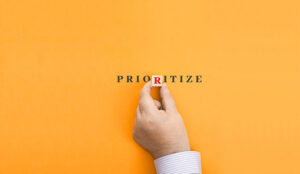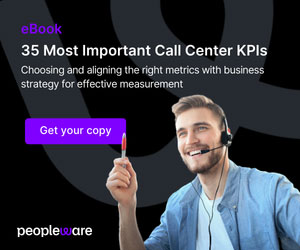All contact centres are now facing a new reality.
Following the pandemic and the global shutdown of the cluttered call centre, hybrid work has emerged as the go-to strategy for future employment. In the years to come, the chances are that only a portion of your agents will be working in-house.
The rest of your team, distributed worldwide, will be using cloud-based technology and CCaaS ecosystems to stay productive outside of the “traditional” office.
The good news is that hybrid workstyles can represent exceptional opportunities for businesses. They’re a chance to access the best of both worlds through a combination of remote and in-person teams while minimizing overhead costs.
The bad news is it isn’t always easy to keep your finger on the pulse of employee wellbeing and engagement in a hybrid workspace.
Why Prioritize Employee Wellbeing in the Hybrid Workplace?
Research constantly proves the connection between employee wellbeing and their engagement, work effectiveness, and productiveness.
If your contact centre agents feel good (emotionally and physically), they work harder, deliver better customer service, and spend less time calling in sick. Agents who feel their needs are considered by leadership are up to 4.6 times more likely to perform at their best.
Unfortunately, when only a portion of your employees are “in the workplace”, it’s easy to forget about wellbeing for the entire team.
So, how do companies ensure that wellbeing remains at the heart of their company culture, and their contact centre?
Step 1: Know What Matters to Your Contact Centre Agents
First, companies need to understand their contact centre agents and get a sense for what matters most to them, so they can deliver the right tools and resources. According to research from Glassdoor, most workers value company culture, quality leadership, and access to opportunities most.
- Company Culture: To ensure company culture remains strong in a hybrid workplace, make sure that everyone in your contact centre team has a voice. Employees should communicate frequently through cloud-based tools like Microsoft Teams, so that everyone feels like they’re in the loop. Host meetings via video chat so everyone can attend and keep team members up to date with regular announcements and newsletters.
- Quality Leadership: Ensure all of the employees in your hybrid workplace feel they’re getting the right guidance from leadership. Managers should have the right tools to monitor their employees and help when they need it. Barge in and whisper functionality will be helpful in dealing with complex customer conversations and the risk of lost clients.
- Training Opportunities: Employees feel happier at work if they feel as though their career is going somewhere. With that in mind, talk to your agents about the kind of training opportunities they want to pursue, and what’s available to them. Tools like Viva Learning in the Microsoft ecosystem can allow employees to easily discover and share training courses microlearning content and more, so everyone can consistently update their skills.
Step 2: Keep Teams Connected
In a hybrid environment where you’re not always connected to all of your colleagues, it’s easy to feel like you’re isolated and disconnected from the team.
Remote employees in particular can feel as though they’re not making any positive progress towards their goals without regular feedback from managers. Unfortunately, supervisors rarely have the time to check in on every employee.
Dashboards and digital signage for both your in-office and remote employees can give everyone an insight into how they’re performing compared to their peers. This makes it easier for employees to track their own performance and determine when they’re reaching their goals.
The same wallboards and digital tools can also bring employees together in team gamification experiences.
You could ask groups of in-office and remote workers to compete to achieve the best metrics and reward the ones with the highest results. This boosts engagement and the sense of camaraderie employees feel with their colleagues.
At the same time, tools like Microsoft Teams provide employees with a way to stay connected through regular chat messages, video, and audio calls.
There are even solutions like Viva Connections, which empower employees to create company town halls, and provide employees with regular updates on business news.
Step 3: Empower Employees With the Right Tools
In the contact centre, employee dissatisfaction, stress, and churn often come from frustrations with difficult interactions, and complex technology. The more your employees have to struggle to manage customer queries, the more likely they are to feel overwhelmed.
Employees who feel happy with their work environment, on the other hand, are up to 16% more productive. In the new hybrid work environment, companies investing in employee wellbeing will need to ensure they’re giving their teams the tools they need to be as productive as possible.
When your staff can quickly solve customer problems, achieve higher satisfaction scores, and accomplish performance goals, it’s not just your clients that benefit.
A streamlined CCaaS experience for both your home and in-office contact centre makes employees feel confident and productive, so they’re more likely to be satisfied by their overall work experience. Some of the tools that may help your employees to feel more empowered include:
- Cloud contact centre tools that combine the fully omnichannel customer service strategy into one environment for less time spent jumping between channels.
- Internal communication tools which enable collaboration and specialist support for team members dealing with complex issues.
- Knowledgebases and educational tools to support employees in answering their own questions and overcoming common problems.
Step 4: Take a Holistic Approach to Employee Wellbeing
Companies everywhere need to recognize that improving employee wellbeing isn’t just about giving team members access to tools to help them keep fit, or better diet plans.
Around 54% of lost working days are attributed to stress and anxiety. Depression, mental health disorders, and other common concerns are becoming more evident since the pandemic.
A strong strategy for wellbeing in the age of hybrid work will need to consider all aspects of the employee experience, including:
- Environment: Making sure employees have the right tools and resources for good work and health. This could even include issuing contact centre phones to agents that need them.
- Physical health: Supporting employees in boosting their physical health with resources for diet, exercise, and other wellness strategies. Microsoft Teams users could even create Wikis or physical health to-do lists for their hybrid teams.
- Mental health: For emotional wellbeing, companies need to ensure they have an open-door policy for employees who need to discuss their mental health. Sometimes, even analytical tools can make it easier to see which employees are struggling. Viva Insights and Microsoft Teams analytics can show when employee productivity levels and engagement are dropping.
Step 5: Listen to Your Employees
A holistic approach to wellbeing also means listening to your employees and taking their suggestions seriously.
Your employees should always have a way to come and make suggestions on how to improve wellbeing, whether it’s agents in the office looking for more support with health and hygiene precautions after the pandemic, or remote agents struggling with isolation.
Business leaders can use analytics and CCaaS tools to track things like productivity and engagement in the age of the hybrid contact centre. Companies can even invest in team communication tools like Microsoft Teams to keep staff connected. However, agents will always be the people on the front lines most capable of providing insights into the tools required for wellbeing.
Look for ways to encourage as much feedback as possible from your employees, by:
- Issuing anonymous surveys and polls: Give your employees a chance to share their feedback without putting their name on their comments. This could encourage some team members to be more open about what they think.
- Having one-on-one meetings: Having regular one-on-one conversations with employees is a great way to learn more about their experiences, needs, and expectations in a hybrid working environment. You can also use these opportunities to gather ideas on how to improve the working experience for everyone involved.
- Regular group meetings: Getting everyone involved in a discussion that involves specifically talking about workplace wellbeing and how to improve it is another excellent opportunity. In this environment, every idea should be given attention and respect. Make your employees feel safe when sharing their thoughts.
Master Employee Wellbeing in the Age of Hybrid Work
Preparing for a future of hybrid work in the contact centre isn’t just about investing in the right tools and cloud software. Today’s contact centres also need to think about how they’re going to empower and support employees in an evolving environment.
Creating a company culture that puts the wellbeing and needs of your employees first could pave the way for excellent outcomes in businesses of any size, from any industry.
When you invest in your employees’ wellbeing, they’ll reward you with more effective customer service for clients, better productivity levels, and higher efficiency rates.
Author: Guest Author
Published On: 25th Jul 2022
Read more about - Guest Blogs, Geomant



































